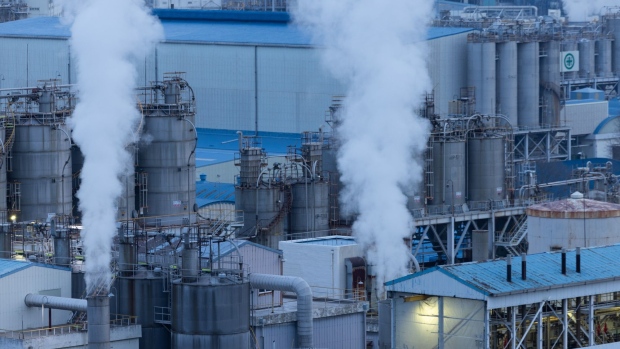Mar 20, 2023
Top Polluters in South Korea Given Easier Path to Cut Emissions
, Bloomberg News

(Bloomberg) -- South Korea will give major industries a slightly easier target to curb emissions under new plans for climate action that emphasize the use of nuclear power, carbon capture technology and offsets.
The country’s industrial sector will be allowed to emit a total of 231 million tons of carbon dioxide equivalent by 2030, up from a previous target of 223 million tons, according to proposals published Tuesday and which follow President Yoon Suk Yeol’s election last year.
Corporate polluters accounted for a total of about 615 million tons of emissions in 2021 and decarbonizing South Korean industry — which includes flagship technology and auto firms — is crucial for the nation to meet its targets for climate action, BloombergNEF said in a report this month.
“Deciding the industrial sector’s emissions reduction was indeed the biggest challenge for us,” Kim Sang-hyup, co-chairperson of the Presidential Commission on Carbon Neutrality and Green Growth, which developed the plans, told reporters. “As long as Korea maintains its energy-intensive manufacturing-oriented industrial structure, the trajectory of reduction will be gradual.”
The nation’s power grid is heavily dependent on fossil fuels. Industry leaders including Samsung Electronics Co. and Hyundai Motor Co. have struggled to switch to cleaner alternatives, partly because of a lack of land available for wind and solar.
Read more: Samsung Struggles to Go Green in Coal-Addicted South Korea
New proposals from the presidential commission, which need to be approved by the country’s cabinet, aim to lift the role of nuclear energy and call for reactors to account for almost one-third of power generation by 2030. Renewable sources will make up about 22% by that date, according to the plans.
Yoon’s government is also aiming to use 37.5 million tons of offsets from overseas projects, up from 33.5 million tons under a previous plan. The proposals also call for an expanded role for carbon capture and storage.
South Korea’s previous administration in 2021 set tougher national targets to reduce emissions, aiming for a cut to 436.6 million tons by 2030, 40% lower than 2018 levels. Previously, the nation had planned for a 26.3% reduction.
(Updated with a comment in the fourth paragraph.)
©2023 Bloomberg L.P.


